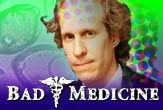Newborn Screening: Birth Right or Something to Fight?

There's a potentially life-saving technique performed on most newborns on the second or third day of their life. If you were born after 1970, chances are it was done to you.
It's called newborn screening. Doctors take a drop of blood from the infant's heel and test for a host of birth defects treatable if intervention comes swiftly.
I say "most" newborns. There are a few parents who remain unimpressed by this medical advance. Two such parents, Scientologists from Nebraska, have asked a judge there to rule the mandatory testing as unconstitutional. They aren't expecting a child; this is a matter of principle for them.
Newborn screening violates the Scientology belief in silent birth.
Trauma of childbirth
Tom Cruise has introduced America to several curious Scientology practices, most recently the birth ritual. The idea here, straight from the mouth of Scientologist founder L. Ron Hubbard, who didn't believe in breastfeeding, is that birth is trauma, and words spoken during pain and unconsciousness can have effects on an individual later in life. So the baby cannot be disturbed for seven days.
That said, severe protein imbalance and pending mental retardation is also trauma that can have an effect on an individual later in life, often by age three in the form of death. That's the kind of thing newborn screening is trying to identify.
Sign up for the Live Science daily newsletter now
Get the world’s most fascinating discoveries delivered straight to your inbox.
Depending on what part of Canada or United States you live in, dozens of newborn screening test are available.
One test mandatory in all U.S. states is for phenylketonuria (PKU). PKU leaves the infant unable to process an amino acid called phenylalanine. The build-up of phenylalanine can cause brain damage and death. Infants fed a low-phenylalanine formula can stay healthy; the baby would then simply need to avoid proteins with phenylalanine.
Legal loopholes
The Nebraska couple who originally filed their lawsuit a little over a year ago and filed a new petition last week managed to skirt testing for their four children, who fortunately were born healthy. The odds were with them. After all, we are talking about extremely rare disorders.
Nevertheless, creating loopholes in the law based on freedom of religion, or L. Ron's Hubbard's beliefs, does not serve the interest of children nor society.
The long-standing controversy over newborn screening at least somewhat makes sense. Given limited health funding dollars and the rarity of some diseases, which do you test for? Testing varies widely from state to state and even within the same state.
The controversy began to boil in the 1990s with advances in tandem mass spectrometry. This enabled the testing of many fatty acid and organic acid disorders, as opposed to amino acid disorders like PKU. There are now over 50 newborn screening tests, yet most hospitals will routinely test for four or five.
Many parents, unlike the Nebraska couple and some born-again Christian groups, are calling for more testing, not less. Yet doctors and insurance companies argue, quite legitimately, that dollars spent on screening (often more than hundreds of dollars for a suite of tests) take away from other lifesaving programs.
Two case studies
Still, one can't help feel for Zachary Wyvill. He was born in April 2003 in an Oakland hospital that didn't test for an organic acid disorder called glutaric acidemia type I.
A second Zachary, Zachary Black, was born shortly later 60 miles away in a hospital that did screen for it. Zachary Black is living a healthy life as a result of a special diet and vitamins. Zachary Wyvill's disease went undetected for several months, and by that time the disease had become irreversible and has since crippled his muscles and brain function.
Testing millions of babies at a great cost? Treating sick children with severe brain and muscle damage at a great cost? Testing for diseases that cannot be cured? These are the profound questions surrounding newborn screening, not whether a pinprick on a baby's heel will induce an engram in its otherwise healthy thetan, as described in Dianetics.
And Tom Cruise can jump up and down on my sofa if he has a problem with that.
Christopher Wanjek is the author of the books “Bad Medicine” and “Food At Work.” Got a question about Bad Medicine? Email Wanjek. If it’s really bad, he just might answer it in a future column. Bad Medicine appears each Tuesday on Live Science.

Christopher Wanjek is a Live Science contributor and a health and science writer. He is the author of three science books: Spacefarers (2020), Food at Work (2005) and Bad Medicine (2003). His "Food at Work" book and project, concerning workers' health, safety and productivity, was commissioned by the U.N.'s International Labor Organization. For Live Science, Christopher covers public health, nutrition and biology, and he has written extensively for The Washington Post and Sky & Telescope among others, as well as for the NASA Goddard Space Flight Center, where he was a senior writer. Christopher holds a Master of Health degree from Harvard School of Public Health and a degree in journalism from Temple University.
Is getting an IUD painful?
'Useless' female organ discovered over a century ago may actually support ovaries, study finds









